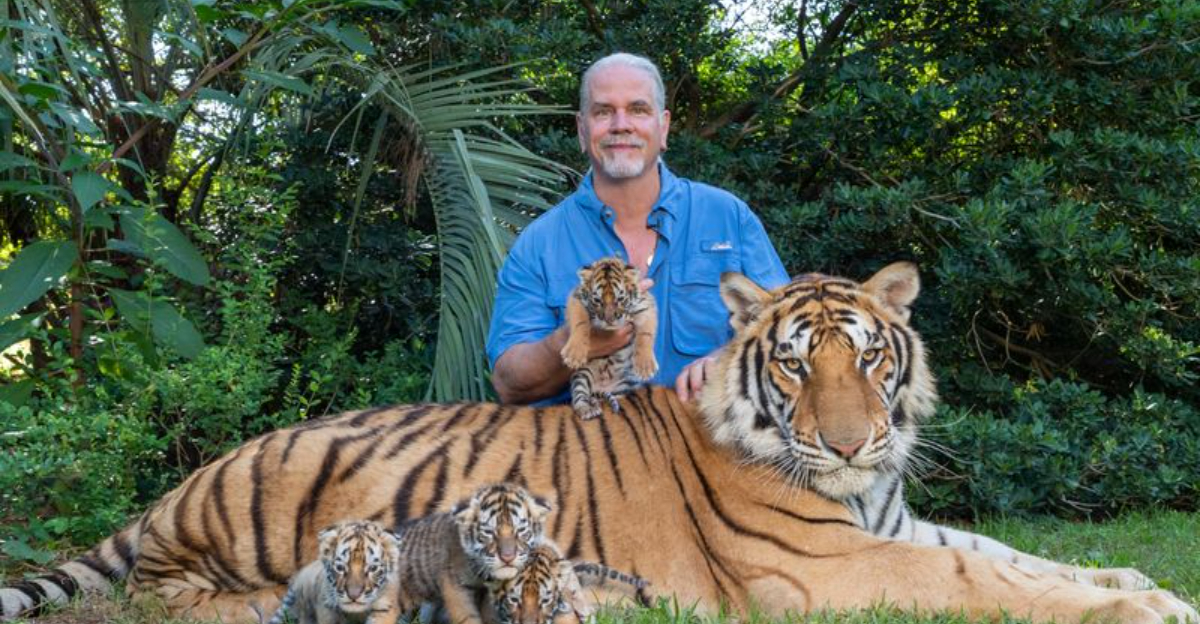📖 Table of Content:
The regulation of big cats in the United States has long been a patchwork of varying state laws, leading to inconsistent protections for these majestic creatures. Prior to the introduction of the Big Cat Public Safety Act in December 2022, certain states stood out for their particularly weak laws regarding the private ownership of big cats. These states either had no regulations at all or only minimal requirements, leaving both the animals and the public vulnerable. Let’s explore nine of these states and their historical stance on big cat laws.
1. Alabama
Alabama, known for its rich southern heritage, once had a notable gap in its wildlife regulations. Before recent federal changes, Alabama did not impose state-level restrictions on the ownership of big cats. This absence of regulation meant that individuals could own animals like tigers and lions without any oversight. The lack of specific laws posed potential threats to both human safety and animal welfare. Despite its cultural charm, Alabama’s lenient stance made it a hotspot for exotic pet ownership. Today, enhanced federal regulations aim to bridge these gaps and ensure a safer environment for all.
2. Nevada
In Nevada, the allure of owning an exotic big cat was as enticing as the bright lights of Las Vegas. Nevada’s laws, or the lack thereof, permitted private ownership of big cats without stringent legal barriers. This legal freedom turned the state into a haven for enthusiasts wishing to own exotic animals. However, this also raised concerns about animal safety and care standards. While Nevada is famous for its entertainment and vibrant culture, its approach to big cat laws was surprisingly relaxed until recent federal interventions introduced more comprehensive regulations.
3. North Carolina
North Carolina, with its lush landscapes and rolling hills, surprisingly had no statewide laws regulating the ownership of big cats. This absence of regulation allowed individuals to own these magnificent creatures without facing legal hurdles. The state’s permissive stance made it a popular choice for those seeking to own large exotic cats. However, the lack of oversight often led to questions about animal welfare and potential dangers to the public. As federal laws now take precedence, North Carolina’s big cat owners face new compliance challenges.
4. Wisconsin
In the cheese-laden state of Wisconsin, there was a time when the rules for owning a big cat were as relaxed as a Sunday afternoon. With no statewide restrictions, Wisconsin residents could own big cats without any permits or oversight. This lenient approach not only raised eyebrows but also concerns about the welfare of both the animals and the local community. Known for its dairy delights, Wisconsin’s laissez-faire attitude extended to exotic animal ownership, making it a unique case in the governance of wildlife. New federal standards are now reshaping these practices.
5. Oklahoma
Oklahoma’s sweeping plains and rich Native American history set the stage for a state with minimal big cat ownership laws. Prior to the introduction of stricter federal regulations, Oklahoma allowed private ownership of big cats with little to no state interference. This leniency often led to an increase in exotic pet ownership, raising concerns about the animals’ living conditions and public safety. Oklahoma’s historical approach to big cat laws reflected its broader laissez-faire attitude towards wildlife management. Today, federal mandates work to mitigate these past leniencies.
6. Indiana
Indiana, famed for its expansive cornfields and the Indy 500, had a history of partial bans regarding big cat ownership. Unlike some states with no regulations, Indiana required permits but still allowed private ownership. This middle-ground approach meant that while some oversight existed, loopholes allowed individuals to own big cats under certain conditions. The state’s regulations reflected a balance between freedom and control, yet often fell short of ensuring comprehensive animal and public safety. Recent federal laws now aim to tighten these gaps and enforce stricter compliance.
7. South Carolina
South Carolina, with its sunny beaches and historic charm, once had a surprisingly lenient stance on big cat ownership. The state imposed minimal regulations, allowing enthusiasts to own exotic cats with few legal barriers. This permissive approach, while reflecting the state’s broader attitudes towards personal freedom, raised significant concerns about animal welfare and public safety. South Carolina’s relaxed laws attracted many who sought to own these majestic creatures. However, the introduction of federal mandates now demands stricter adherence, reshaping the landscape of exotic pet ownership in the state.
8. West Virginia
Nestled in the Appalachian Mountains, West Virginia had a notable leniency towards the ownership of big cats. The state’s lack of stringent regulations made it a favorable destination for exotic pet owners. While West Virginia’s rugged beauty is undeniable, its approach to big cat laws was marked by gaps in oversight and regulation. This laissez-faire attitude often sparked debates about the balance between personal freedom and public safety. Today, with federal mandates in place, West Virginia is undergoing a transformation in its stance towards exotic animal ownership.
9. Mississippi
The mighty Mississippi River flows through a state once marked by its absence of big cat ownership laws. In Mississippi, individuals could own these impressive animals without much state interference. This gap in regulation was reflective of the state’s broader historical attitudes towards wildlife management. While Mississippi’s cultural and natural landscapes are rich and diverse, its hands-off approach to big cats posed challenges for both animal welfare and public safety. Federal regulations now seek to address these issues, ensuring a more balanced and secure environment for all.









